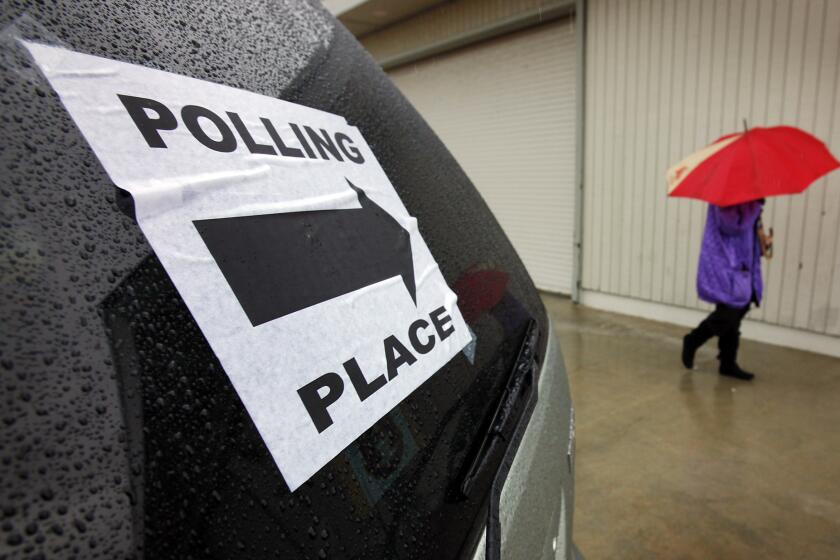Iranian American father and son sentenced to 10 years in prison in Iran, report says
Two Iranian Americans, a father and son, have been sentenced to 10 years in prison in Iran, according to a report published Tuesday by Mizan, the Iranian judiciary’s news service.
Businessman Siamak Namazi and his father, Baquer Namazi, who both hold dual citizenship, have been in custody in Iran and were sentenced on charges of spying for the United States, the report said.
Siamak Namazi was arrested 12 months ago while visiting Iran from Dubai in the United Arab Emirates, where he lives. His detention signaled the enduring danger for dual nationals in Iran despite recent improved ties between the Islamic Republic and the West.
Baquer Namazi, an 80-year-old retired official with the United Nations Children’s Fund (UNICEF), was arrested in February in Tehran, according to family members.

They are believed to be among the only U.S. citizens still jailed in Iran following a prisoner exchange in January that saw three Americans released, including Washington Post journalist and dual Iranian national Jason Rezaian.
The swap was seen as a sign of warming relations between Iran and Western countries following the 2014 agreement in which Tehran agreed to shelve its nuclear program in exchange for an easing of economic sanctions.
President Hassan Rouhani’s government had called on dual nationals to return to Iran to help spur foreign investment. But hard-liners view dual nationals — particularly those from Western countries — as a threat to security.
“Siamak was more active than Jason Rezaian in recruiting spies for America and inserting cultural, military and political spies inside the country,” Javad Karimi Qudossi, a member of the security and foreign policy committee in Iran’s parliament, was quoted as saying by Mizan.
Babak Namazi, Siamak’s brother, issued a statement expressing “utter shock and dismay” at the sentences, particularly that of Baquer Namazi, who suffers from a heart ailment.
“My father has been handed practically a death sentence and it will be a criminal act by me, his only able son, not to fight for my father’s life and freedom as well as that of my brother,” he said.
The court proceedings were shrouded in secrecy, and details of the allegations against them have not been released. Family members said they were sentenced after brief hearings of only a few hours each.
They were not allowed to hire their own defense lawyer due to a law that allows only government-approved lawyers to represent defendants in security-related cases.
Attorney Mahmoud Alizadeh Tabatabei, who frequently represents controversial defendants, said the Namazis attempted to hire him to represent them but were told they could not choose their own lawyer.
A State Department spokesman, Mark Toner, said the United States was “deeply concerned” by the reports and called on Iran to release the Namazis.
Siamak Namazi, believed to be in his 40s, is head of strategic planning for U.A.E.-based Crescent Petroleum Co. He is also friends with members of the National Iranian American Council, a Washington-based group that has advocated for better ties between the U.S. and Iran.
Read more: Why Iranians are disappointed by the nuclear deal »
On Monday, Mizan released brief video footage showing him and his U.S. passport, along with a montage of anti-American images.
Baquer Namazi, a retired UNICEF representative in Somalia, Kenya, Egypt and other countries, and a former Iranian provincial governor, was described by a former U.N. colleague as having a “deep personal commitment to making life better for children and women.”
Analysts believe the pair are prisoners of Iran’s powerful Revolutionary Guards, which could be seeking concessions from the U.S. to secure their release.
“This is a reminder that Iran’s deep state remains in control and hasn’t changed its old ways,” said Karim Sadjadpour, a senior associate at the Carnegie Endowment for International Peace in Washington.
“It’s still in the business of hostage trading. Even 80-year-old men with heart conditions are fair game.”
Special correspondent Mostaghim reported from Tehran and staff writer Bengali from Mumbai, India.
Follow @SBengali on Twitter for more news from South Asia
ALSO:
Many in China see the U.S. as a greater threat than Islamic State, new report says
UPDATES:
5:35 p.m.: This article was updated to clarify the nature of Namazi’s links to the National Iranian American Council.
This article was originally published at 1:15 p.m.
Sign up for Essential California
The most important California stories and recommendations in your inbox every morning.
You may occasionally receive promotional content from the Los Angeles Times.








